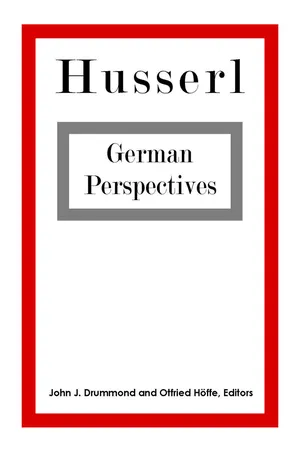
Husserl
German Perspectives
- 320 pages
- English
- ePUB (mobile friendly)
- Available on iOS & Android
About this book
Edmund Husserl, generally regarded as the founding figure of phenomenology, exerted an enormous influence on the course of twentieth and twenty-first century philosophy. This volume collects and translates essays written by important German-speaking commentators on Husserl, ranging from his contemporaries to scholars of today, to make available in English some of the best commentary on Husserl and the phenomenological project. The essays focus on three problematics within phenomenology: the nature and method of phenomenology; intentionality, with its attendant issues of temporality and subjectivity; and intersubjectivity and culture. Several essays also deal with Martin Heidegger's phenomenology, although in a manner that reveals not only Heidegger's differences with Husserl but also his reliance on and indebtedness to Husserl's phenomenology.Taken together, the book shows the continuing influence of Husserl's thought, demonstrating how such subsequent developments as existentialism, hermeneutics, and deconstruction were defined in part by how they assimilated and departed from Husserlian insights. The course of what has come to be called continental philosophy cannot be described without reference to this assimilation and departure, and among the many successor approaches phenomenology remains a viable avenue for contemporary thought. In addition, problems addressed by Husserl—most notably, intentionality, consciousness, the emotions, and ethics—are of central concern in contemporary non-phenomenological philosophy, and many contemporary thinkers have turned to Husserl for guidance. The essays demonstrate how significant Husserl remains to contemporary philosophy across several traditions and several generations.Includes essays by Rudolf Bernet, Klaus Held, Ludwig Landgrebe, Dieter Lohmar, Verena Mayer and Christopher Erhard, Ullrich Melle, Karl Mertens, Ernst Wolfgang Orth, Jan Pato?ka, Sonja Rinofner-Kreidl, Karl Schuhmann, and Elisabeth Ströker.
Tools to learn more effectively

Saving Books

Keyword Search

Annotating Text

Listen to it instead
Information
- Psychologism presupposes (explicitly or implicitly) that logic is applied logic or normative logic. This presupposition is unjustified. The sense-content of logical laws contains neither a relation to a thinking subject and the nomological connection of experiences of thinking nor a normative (regulative) claim (“If you want to think correctly, you must think in a way prescribed by the logical laws”).2 Every normative discipline rests upon a purely theoretical discipline whose object is the purely theoretical content, separated from all normative content, of the discipline concerned. The laws of pure logic can, for didactic reasons, be interpreted as normative. However, this interpretation concerns only their practical application, not the content of the propositions themselves.
- Psychologism neglects or obscures the difference between the logical connection of the contents of thought and the psychological connection of the experiences of thinking. It presupposes that there is no essential difference between the two domains, so that it would be possible to speak of the one domain (logical laws) in the terminology of the other (experiences of thought). The real [reale] relationship of cause and effect takes the place of the logical relation of ground and consequence. It is a mistake to confuse the two, for doing so contradicts the proper essence of the logical objects. The law of noncontradiction, for example, is not about the inability to think two propositions that contradict one another at one and the same time but the objective incompatibility of the contents of those propositions.
- Psychologism disregards the difference between the sciences of idealities and the sciences of realities which is grounded in their respective object domain and the character of their respective laws. The laws of the empirical sciences are laws concerning matters of fact. The propositions of logic pronounce nothing concerning real objects and events. No logical law is a law of matters of fact. In particular, neither in accordance with their justification nor their content do logical laws presuppose anything psychological (“factuality of psychic life”). In Prolegomena to Pure Logic, the conflict between psychologism and antipsychologism bears the title “logical absolutism (logical idealism) versus relativistic (skeptical) psychologism.” In this title, the point of departure and the direction of the critique become clear. Its objective is to demonstrate the countersensical consequences of psychologism.
- If the psychologistic interpretation of logic were correct, then logical laws would be psychological laws referring to experiences of thinking, and accordingly they would be laws of matters of fact acquired by means of inductive generalizations. As such, they would have only probable validity. Formal-logical laws, however, have a validity that is exact and necessary in the strict sense (independent of all experience).
- Psychologism is, as an individual or specific (anthropological) relativism, a form of skepticism. It cancels itself out by violating the conditions of possibility of any theory whatsoever, specifically (a) the subjective-noetic conditions (e.g., evident judgments are to be distinguished from non-evident judgments) and (b) the objective-logical conditions (e.g., each science is a science on the basis of the unity of the connection to its grounding, which is why sciences presuppose the validity of the rules of deduction).3 Psychologistic approaches confuse the subjective-anthropological unity of cognition (a methodological unity of the specifically human attainment of cognition) with the objective-ideal unity of the content of cognition (the idea of the theoretical unity of truth).
Table of contents
- Cover
- Title Page
- Copyright
- Contents
- Introduction
- Part I: Phenomenology and its Methodology
- Part II: Aspects of Intentionality
- Part III: Subjectivity and Culture
- Acknowledgments
- List of Contributors
- Index
Frequently asked questions
- Essential is ideal for learners and professionals who enjoy exploring a wide range of subjects. Access the Essential Library with 800,000+ trusted titles and best-sellers across business, personal growth, and the humanities. Includes unlimited reading time and Standard Read Aloud voice.
- Complete: Perfect for advanced learners and researchers needing full, unrestricted access. Unlock 1.4M+ books across hundreds of subjects, including academic and specialized titles. The Complete Plan also includes advanced features like Premium Read Aloud and Research Assistant.
Please note we cannot support devices running on iOS 13 and Android 7 or earlier. Learn more about using the app